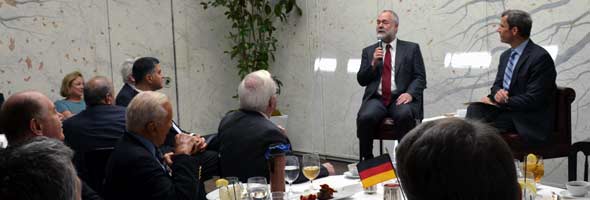
Markus Meckel, a member of the German parliament for two decades, said he was “not sure” that Russian President Putin was still acting rationally, and strongly criticized businessmen in Germany who have been resisting the imposition of sanctions on Russia after the annexation of Crimea. Meckel, who was once foreign minister in East Germany and from 1998 to 2006 was head of Germany’s delegation to NATO, said at a LAWAC roundtable lunch “we must be very clear on the question of sovereignty,” and called for much stronger sanctions on influential figures in Moscow.
“We shouldn’t start with military action, but it is right for the US and NATO to deploy more troops to the east to send a strong message – I think we should also have AWACS (Airborne Warning and Control System planes) to look along the Ukrainian border." In addition, Meckel said that the number of people sanctioned – 33, with another 15 being added – should be increased “to 200 or 500 – all those Russians who would like to send their families to the West. I would increase this number very fast to be very clear – and this would be painful for Putin.” Once these wealthy oligarchs lose their trust in Putin, “he will be in trouble. I think this would be the beginning of the end for Putin.” When asked about the CEO of Siemens, who flew to Moscow to meet Putin just eight days after the annexation of Crimea, Meckel was very critical. German executives who were trying to maintain their business links with the Russians and just call for dialogue, not sanctions, were full of “crazy ideas,” he said.
But although Meckel urged strong measures against Putin for what he is doing in Ukraine, he also said the west is not without blame in fostering the crisis. “For the past 25 years we have not been paying attention – despite the launching of the Partnership for Peace between NATO and Russia in 1993, the West did not treat Russia like a partner.” Just as the British and the French were reluctant to give up their empires, so too Russia finds it hard to give up its former Soviet space. And although NATO describes itself as a defensive alliance, when Moscow sees eastern European countries like Poland and the Czech Republic joining NATO, followed by the Baltic States, it feels as if the West is trying to encircle Russia. So Meckel said that while we should not tolerate Russia violating other countries’ sovereignty, “on the other hand we should make clear we are interested in a dialogue on security with them.”
However, Putin may not be open to such a dialogue. Asked if he thought Putin was a rational actor, Meckel said that up until a year and a half ago, “I thought he was reasonable. But today I can’t understand his logic – in my view he is undermining Russia.” He said that Russia is clearly in economic decline, and desperately needs to modernize, which will require substantial investment and cooperation with the west. “He is destroying the framework which is needed for future cooperation and development.” And when he was asked whom he saw as a successor to Putin, Meckel said “I can’t see – but I hope it is soon!”
Looking back to the falling of the Wall 25 years ago, Meckel said: “In the US you say ‘we won the Cold War’ – but in my view it was not a victory of the west over the east, but a victory for western values… the people in the east wanted to have freedom and democracy, and wanted to achieve this through peaceful negotiation.” Meckel said that while NATO was important, it could not have brought down the Wall on its own – it needed the people in the east to be ready. “There is a message here for us as we try to deal with other dictatorships around the world – the west can’t bring them down on its own.” Watching the end of communism from within East Germany, he said his main lesson from the fall of the Berlin Wall was that “Change does not come from good diplomacy, it comes from the people.” Whether and at what point the Russian people might want a change remains to be seen.
